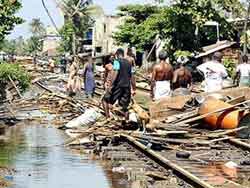Tsunamis ruin Southeast Asia's tourist business, devastate regional economies
Travel agencies all over the world cancel their offers for Thailand, Maldives

The tremendous earthquake and tsunamis that hit Southeast Asia killed tens of thousands of people and ruined the economy of the region. Tidal waters have destroyed the entire infrastructure on the coast on many kilometers inland. The grieving countries are calling for help. The World Bank evaluated the sum of the first financial help to the region in $5 billion. The WB promised to collect the money and discuss a possibility to delay or write off the debts of the flooded countries. 
The International Monetary Fund has also promised to help the governments of the countries, which suffered as a result of the mammoth earthquake. The economies of certain countries of the southeastern coast, particularly Sri Lanka and Bangladesh, depend on the IMF's economic views. It is an open secret that the reforms of the fund stipulate a tough credit dependence on the IMF. That is why the governments of the IMF-dependent states have to hope for the fund's benevolence as far as the debt payments and loan interests are concerned.
The actual damage in the region, however, may become a smaller problem in comparison with another serious region that Southeast Asia is dealing with at the moment. News reports and rumors about thousands of dead bodies in the sea and on the mainland might ruin the tourist attraction of the region.
Tourism is a major source of income for the region. About 64 percent of residents of the Maldives are employed in the tourist business, which yields two-third of all incomes of the national economy. Tourism brings about ten percent of the GDP even in export-oriented industrial fields of Malaysia and Indonesia, RBC news agency reports.
The shares of two regional airlines, Thai Airways and Singapore Airlines, were the first to drop on the stock market after the earthquake. The airlines deal with tourist transportations – needless to say that tourists are not going to appear in the tsunami-struck region for quite a long period of time. The start of the European tender began with a slide of tourist companies' shares – Club Mediterranne (France), TUI (Germany) and others. Insurance companies suffer losses too: market members remember recent huge payments that insurance companies had to make to Mitch hurricane victims in the USA. Quotations of Europe's largest companies dropped too.
The tourist business has been hit at the moment, when the travel industry in the countries of Southeast Asia started recovering from the crisis, which ended only in 2003. The crisis was presumably caused with terrorist acts in the USA and in the region itself, on Bali Island. Southeast Asia suffered most from an outburst of a previously unknown disease – the SARS virus.
Tourist firms' income increased in 2004. The regional tourist industry will have to deal with a very serious country now, after the peak of the tourist activity this winter. The decline of the tourist business will lead to social tension and a high unemployment level in the region.
PRAVDA.Ru has reported before that Russian tourists still consider Southeast Asia as a tourist attraction and a very good place to spend winter holidays in. Very few of the Russian tourists decided to cancel their plans to see the New Year in Thailand, NTV network reports. The number of refusals was not enough to cancel charter flights, and hundreds of Russian tourists flew to the disaster area. “A charter plane took off from St.Petersburg. No one of the 220 tourists asked for their money back. Another plane is to leave tomorrow with 220 tourists too,” Irina Tyurina, the press secretary of the Russian Association of Travel Agencies said.
It is noteworthy that the majority of Western tourist firms have canceled their offers for Thailand, Maldives and other countries of the grieving region. Almost all companies pay their clients' money back.
The majority of Russian travel agencies, however, refused to compensate even a part of tour costs for their clients. They claimed that the emergency in Southeast Asia was categorized as force majeure, which does not stipulate any reimbursement. That is why Russian tourists still travel to Thailand; many of them say that they had to do so because they did not want to lose their money. Needless to say that the quality of services in the resorts of Southeast Asia is obvious at the moment – there is no quality at all. Russian travel agencies take care of their own interests to the detriment of their clients' security, a spokesperson for the Association of Russian Travel Agencies said. It is worth mentioning, though, that some tourists do not want to give up their holiday plans themselves. One can only guess what pleasures such holidays can give, taking into consideration the fact of possible quakes in the region.
Artyom Sergeyev
Subscribe to Pravda.Ru Telegram channel, Facebook, RSS!





